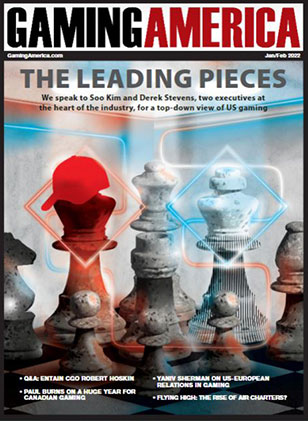
The junket giant closed all of its VIP gambling rooms in Macau following the arrest. J.P. Morgan analysts then suggested that the region’s VIP revenue would contract a further 30-50% in the coming weeks. Several casinos in Macau have also now reported that they will close VIP rooms run by junket operators.
Asia Gaming Brief (AGB) held a panel on the future of junkets and the implications for Asia’s VIP market, with several industry experts sharing their opinions on what will happen next. How will it affect the US operators based in Macau?
When asked if he thinks the junket model is dead, Alidad Tash, Managing Director, 2NT8, responded: “It appears so. We all knew that junkets were going to go down, it’s been going on since 2013, but the last 12/13 days, just the speed by which they’re on the way down and almost going to be diminished is mind-boggling.”
Martin Purbrick, Principal, Purbrick & Associates Ltd, agreed on the future of junkets, noting: “It clearly is the end of the junket model. I’d also say that it’s not the case that junkets are suddenly illegal in the People’s Republic of China. It’s always been illegal. But in other business sectors, you’ll see that the law is enforced arbitrarily in China, and that’s the point for gambling as well. When the authorities want to enforce the law, they’ll enforce it.”
Carlos D. Simões, Partner at DSL Lawyers, explained the legal side of things, noting: “What I would say is that if we’re going to go through the end of junkets, that’s going to happen without minimum legal changes. Junkets have been a licensed activity in Macau since 2004; they are subject to supervision, and although we have gone through this storm since the arrest of Alvin Chau, the reality is there have been no legal changes to the existing regime.
“So I would say from a legal point of view that everything is the same... but at the same time, everything has changed.” Simões and Martin returned to the discussion to explain how different parties will be impacted by recent events, with the former saying: “This is going to be a very tough call for the Macau economy overall; because it’s not only the junkets, there’s a lot of activities that serve these VIP players that have been erected to serve them, to bring the best services, and there is a lot of spending in Macau that is related to them. So certainly there will be a major impact, and how this system without the junkets is going to be able to bring players to Macau to keep spending money, that’s a question that at the moment no one can answer. But it will be a problematic one, for sure.”
Martin, meanwhile, ponders the issue of how the money moves out of the mainland, for example through pawn shops. “The technical term for that is money laundering,” he says. “And that’s the problem in Macau. So the primary concessions, the license holders, have to think very differently about their model in the future.
“The term ‘integrated resorts’ really means that. For the past decade, the primary operators have managed with this junket model and become cash-rich; junkets become cash-rich as well, and junkets have become regional entities in some ways... Sun City of course with resorts in other countries.
“So there’s a lot of shakeout from this that, unfortunately, I don’t think will benefit Macau. That demand for gaming from mainland China is definitely still there. It needs to exit the mainland, but where does it go? I sense it will be difficult to go to Macau, because obviously it’s within the PRC borders, and the authorities have greater controls and greater scrutiny on everything. And hence I sense that there’s more of that demand likely to go across the region: maybe even back to Vegas if those players can get their money out of the mainland.”
Continuing on the theme of how different jurisdictions will be treated, Ben Lee, Managing Partner, IGamiX Management and Consulting, explained that a system of tiers will perhaps be put in place.
“We have seen some constraints already imposed by China on some of these other jurisdictions. So they are not limiting the crackdown on gambling just to Macau. It’s not just a case of different countries or jurisdictions being blacklisted, but it’s also probably a list of different tiers of treatment.
“Macau is probably on the lowest tier, so they will allow people to come into Macau, provided they are individually vetted. Same thing probably, maybe tighter, if they would go to Cambodia, as it is a friendly country to China. On the contrary, I haven’t heard of any Chinese tourists being allowed into the Philippines as yet. We do have different tiers and we think that’s what’s happening.”
Kelly Amato, Director – Southeast Asia Industrials, Fitch Ratings, weighed in on the discussion with a particular focus on Australia, and one of the major global operators in Crown Resorts. When asked if there are similarities between what has happened in Macau and Australia, she replied: “In some ways yes. We had the Crown arrests in 2016, so obviously there was heightened scrutiny when it came to VIP betting in China with regards to Crown.
“In some respects as well, yes it was probably showing that there was some smoke there, and then in 2019 we had the in-depth media investigations taking place on money laundering and the Chinese gaming laws. After those in-depth reviews, Crown was deemed unfit to hold their license and they are currently going through that remediation process. And out of those reviews, there’s also been a ban on junket operations in Australia now.”
Steve Vickers, Founder, Steve Vickers and Associates, suggested it is a significant moment for Macau’s gaming industry, believing it is now a much broader problem than many perhaps initially perceived.
“This is a significant change,” added Vickers. “It’s not just about junkets and whether we describe them as premium mass etc, it has gone beyond that, this is a very significant difference; and I think the Government will push very hard to try and turn Macau into something different than it is at the moment.
And staying on the topic of concessionaires, like most within the industry, Vickers was unsure as to what the future holds.
“All bets are off,” he stated. “It’s an issue of both business risk and political risk. Each major concessionaire has a slightly different profile. There’ll be a big difference between local and American and foreign ones, given the current rate of relations between the US and China.”
And when asked if he believes it is worth bidding for the license again, Vickers replied: “Everybody needs to really analyze what the impact is to their business, as political risk is absolutely paramount right now. It’s time to work out what the options are. I’ve always hated the junket model, I’m surprised it’s lasted as long as it has, but I think we can pretty well say that the junket model as we understand it is gone.”

